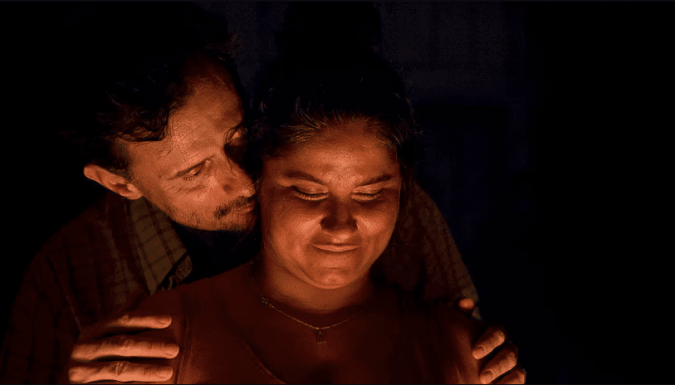In the beginning there’s only darkness. And silence. Or rather, the kind of silence that noisily fills up the spaces where there are no words: there’s the hushing wind, the croak of frogs, the swift and gentle swish of the water around you. A bobbing flashlight aimed ahead slowly illuminates bits of your surroundings: the front of a slim canoe, some greenery in the river banks, eventually another bobbing light that announces you’ve arrived at the planned destination, a small river island at the crossroads of the Colombian/Peruvian/Brazilian border. From the outset, Beatriz Seigner‘s moody sophomore feature alerts you to the fact that this Colombian film is interested in what’s beyond what we can see—and hear. It’s titled Los Silencios, after all.
By the time Seigner’s camera finally sets the stage in this water-riddled community (think Beasts of the Southern Wild) we get to meet Amparo (Marleyda Soto) and her two kids, wordless Nuria (María Paula Tabares Peña) and unruly Fabio (Adolfo Savilvino). They’ve been displaced by the ongoing armed conflict, which the Colombian government hopes to end with peace talks in Havana. Having lost her husband, stoic Amparo is hoping to claim their life insurance and flee Colombia to seek residence in nearby Brazil, where her husband was from. Seigner prefers slow, languid takes that showcase the natural beauty and terror of all that surrounds Amparo in this new environment. Thus, with great care, Los silencios wades through the mundanity of trying to build a life anew with little to nothing to your name. Chores like getting Fabio enrolled in school and getting him the right uniform, talking to immigration authorities to prove she’s in real danger, dealing with lawyers who remind her it’ll be hard to settle her claims if her husband’s remains aren’t found, and trying to find a job in this Amazon community that barely survives, steady us in Amparo’s resolve.

Soto’s earthly and grounded performance makes her Amparo stand in for the many women who have come to bear much of the consequences of the violence in Colombia. She’s pragmatic but not unfeeling. She’s concerned with the specifics of daily life, but Seigner surrounds her with enough signs that put her into greater context. At one point, an overhead news report from Havana highlights the push for the peace treaty conversations to better center on women’s experiences during the war. Los silencios feels like an unassuming response to such demands, slowly offering us, in chronicling Amparo’s daily grind, a window into what fleeing from violence can look like.
Just as slowly, though, Los silencios reveals itself to be a ghost story. Yet the supernatural, as with the magical realism that so pervades Colombian storytelling, is hard to disentangle from the mere natural. Seigner’s story is an Amazon-set haunting that feels more akin to films like The Others and The Sixth Sense than to any image of clanging chains or pale-white spirits. This is a story of a woman intent on moving on, even as she knows she’ll always carry the dead with her. And Seigner’s gentle touch gives it heft even as she focuses on the humdrum — on making dinners and arranging baths, filing forms and sewing uniforms. The effect the director accomplishes once you start to realize the line between the living and the dead is eerily porous is as disorienting as it is impressive. Existing neither as tidy parable about what it means to let one’s past be gone, nor as a supernatural take on the way Colombia’s violence endures beyond death and at the edge of forgiveness, but hovering somewhere in between, Los silencios is a quiet marvel.
Los silencios screened as part of 2019’s Havana Film Festival New York.




